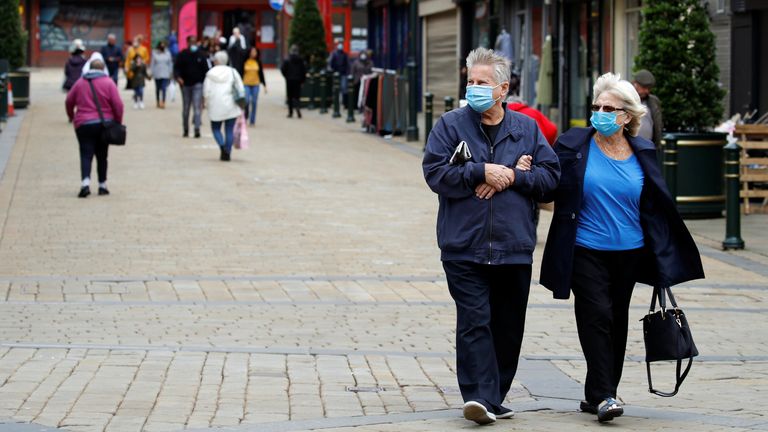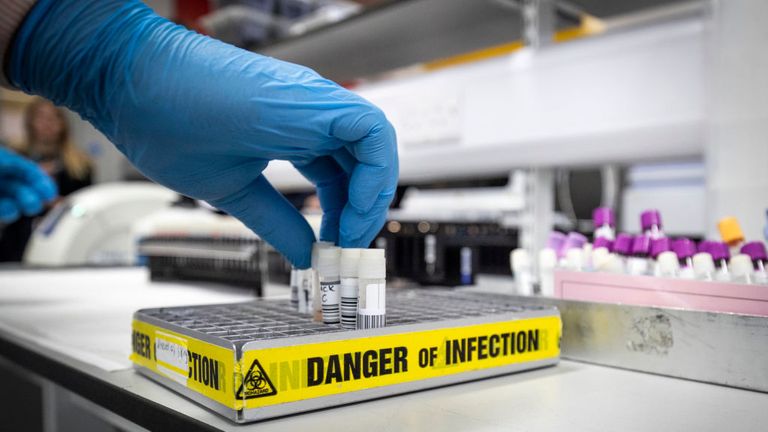Hopes that the population will become immune to COVID-19 have been dashed by new research showing antibodies fall rapidly after recovering from the disease.
So-called herd immunity has been proposed by some scientists as a better alternative to lockdowns in tackling the coronavirus pandemic.
It would require around 50-60% of the population to have protection against the virus so it could no longer transmit efficiently.
However, a major UK study has found that rather than building immunity over time, the number of people with antibodies has fallen by 26% since lockdown was eased over the summer.
Researchers from Imperial College London screened 365,000 people over three rounds of testing between June and September.
Results of the REACT-2 study showed that 6% of people had antibodies to the virus around the time lockdown was eased in late June and early July.
But by the start of the second wave last month, this dropped to just 4.4%.
Professor Helen Ward, one of the researchers, said the new results strongly suggest that herd immunity is unachievable.
“When you think 95 people out of 100 are still likely to be susceptible, we are a long, long way from anything resembling population level protection against onward transmission,” she said.
“It’s not something you can use as a strategy for infection control [for COVID-19] in the population.”
The finding is another blow to scientists behind the controversial Great Barrington Declaration, who had suggested that vulnerable people could be shielded at home while the virus spreads through the young and healthy to build up herd immunity.
The proposal has been strongly criticised by many other scientists.
The researchers found younger people, those from black, Asian and minority ethnic (BAME) communities and health workers had higher antibody levels, possibly because they were in regular contact with infected individuals.
The fall in antibodies suggest people will be regularly re-infected, just as they are with related coronaviruses that cause the common cold.
Professor Wendy Barclay, an infectious diseases specialist and one of the researchers, said antibodies peak three to four weeks after symptoms and then drop away, as they do for related viruses.
She said: “Seasonal coronaviruses that circulate every winter and cause common colds can re-infect people after six to 12 months.
“We suspect that the way the body reacts to infection with this new coronavirus is similar to that.”
There have so far only been a handful of documented cases of re-infection.
:: Subscribe to the Daily podcast on Apple Podcasts, Google Podcasts, Spotify, Spreaker
Dr Alexander Edwards, associate professor in biomedical technology at the University of Reading, said: “What is not clear is how quickly antibody levels would rise again if a person encounters the virus a second time.
“It is possible they will still rapidly respond, and either have a milder illness, or remain protected through immune memory.
“So even if the rapid antibody test is no longer positive, the person may still be protected from re-infection.”
The study, which is yet to be peer reviewed, only measured antibodies.
It is possible that another arm of the immune system called T-cells, may remain active, but there is currently no available test for them.
Scientists are cautious about using the results to predict the protection provided by a vaccine.
They say immunisations may lead to a more robust antibody response.
Health Minister Lord Bethell said the study “is a critical piece of research, helping us to understand the nature of COVID-19 antibodies over time, and improve our understanding about the virus itself”.
He added: “We rely on this kind of important research to inform our continued response to the disease, so we can continue to take the right action at the right time.
“It is also important that everyone knows what this means for them – this study will help in our fight against the virus, but testing positive for antibodies does not mean you are immune to COVID-19.”


